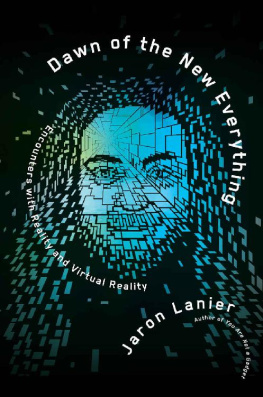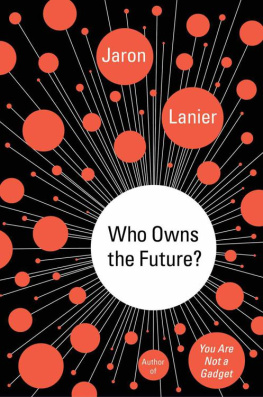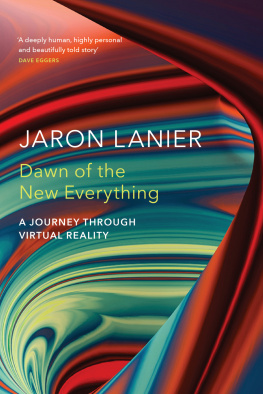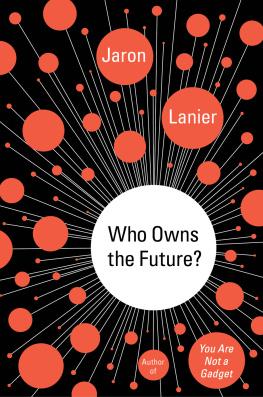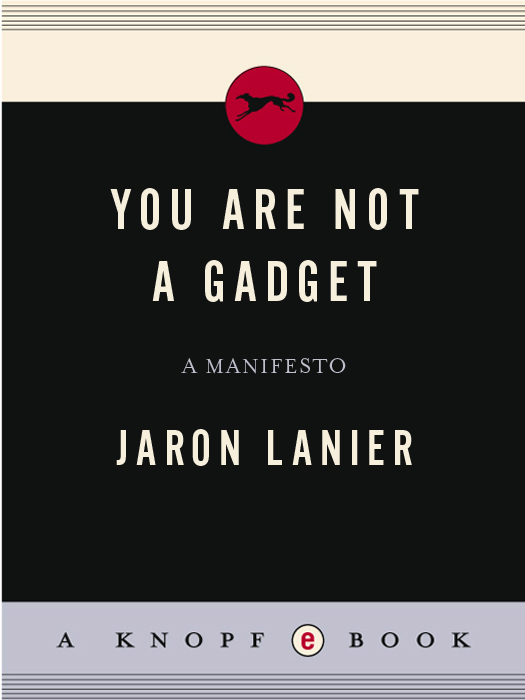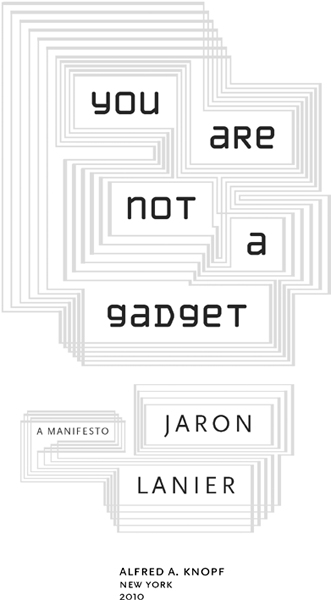Preface
ITS EARLY in the twenty-first century, and that means that these words will mostly be read by nonpersonsautomatons or numb mobs composed of people who are no longer acting as individuals. The words will be minced into atomized search-engine keywords within industrial cloud computing facilities located in remote, often secret locations around the world. They will be copied millions of times by algorithms designed to send an advertisement to some person somewhere who happens to resonate with some fragment of what I say. They will be scanned, rehashed, and misrepresented by crowds of quick and sloppy readers into wikis and automatically aggregated wireless text message streams.
Reactions will repeatedly degenerate into mindless chains of anonymous insults and inarticulate controversies. Algorithms will find correlations between those who read my words and their purchases, their romantic adventures, their debts, and, soon, their genes. Ultimately these words will contribute to the fortunes of those few who have been able to position themselves as lords of the computing clouds.
The vast fanning out of the fates of these words will take place almost entirely in the lifeless world of pure information. Real human eyes will read these words in only a tiny minority of the cases.
And yet it is you, the person, the rarity among my readers, I hope to reach.
The words in this book are written for people, not computers.
I want to say: You have to be somebody before you can share yourself.
PART ONE
What is a Person?
CHAPTER 1
Missing Persons
SOFTWARE EXPRESSES IDEAS about everything from the nature of a musical note to the nature of personhood. Software is also subject to an exceptionally rigid process of lock-in. Therefore, ideas (in the present era, when human affairs are increasingly software driven) have become more subject to lock-in than in previous eras. Most of the ideas that have been locked in so far are not so bad, but some of the so-called web 2.0 ideas are stinkers, so we ought to reject them while we still can.
Speech is the mirror of the soul; as a man speaks, so is he.
PUBLILIUS SYRUS
Fragments Are Not People
Something started to go wrong with the digital revolution around the turn of the twenty-first century. The World Wide Web was flooded by a torrent of petty designs sometimes called web 2.0. This ideology promotes radical freedom on the surface of the web, but that freedom, ironically, is more for machines than people. Nevertheless, it is sometimes referred to as open culture.
Anonymous blog comments, vapid video pranks, and lightweight mashups may seem trivial and harmless, but as a whole, this widespread practice of fragmentary, impersonal communication has demeaned interpersonal interaction.
Communication is now often experienced as a superhuman phenomenon that towers above individuals. A new generation has come of age with a reduced expectation of what a person can be, and of who each person might become.
The Most Important Thing About a Technology Is How It Changes People
When I work with experimental digital gadgets, like new variations on virtual reality, in a lab environment, I am always reminded of how small changes in the details of a digital design can have profound unforeseen effects on the experiences of the humans who are playing with it. The slightest change in something as seemingly trivial as the ease of use of a button can sometimes completely alter behavior patterns.
For instance, Stanford University researcher Jeremy Bailenson has demonstrated that changing the height of ones avatar in immersive virtual reality transforms self-esteem and social self-perception. Technologies are extensions of ourselves, and, like the avatars in Jeremys lab, our identities can be shifted by the quirks of gadgets. It is impossible to work with information technology without also engaging in social engineering.
One might ask, If I am blogging, twittering, and wikiing a lot, how does that change who I am? or If the hive mind is my audience, who am I? We inventors of digital technologies are like stand-up comedians or neurosurgeons, in that our work resonates with deep philosophical questions; unfortunately, weve proven to be poor philosophers lately.
When developers of digital technologies design a program that requires you to interact with a computer as if it were a person, they ask you to accept in some corner of your brain that you might also be conceived of as a program. When they design an internet service that is edited by a vast anonymous crowd, they are suggesting that a random crowd of humans is an organism with a legitimate point of view.
Different media designs stimulate different potentials in human nature. We shouldnt seek to make the pack mentality as efficient as possible. We should instead seek to inspire the phenomenon of individual intelligence.
What is a person? If I knew the answer to that, I might be able to program an artificial person in a computer. But I cant. Being a person is not a pat formula, but a quest, a mystery, a leap of faith.
Optimism
It would be hard for anyone, let alone a technologist, to get up in the morning without the faith that the future can be better than the past.
Back in the 1980s, when the internet was only available to small number of pioneers, I was often confronted by people who feared that the strange technologies I was working on, like virtual reality, might unleash the demons of human nature. For instance, would people become addicted to virtual reality as if it were a drug? Would they become trapped in it, unable to escape back to the physical world where the rest of us live? Some of the questions were silly, and others were prescient.
How Politics Influences Information Technology
I was part of a merry band of idealists back then. If you had dropped in on, say, me and John Perry Barlow, who would become a cofounder of the Electronic Frontier Foundation, or Kevin Kelly, who would become the founding editor of Wired magazine, for lunch in the 1980s, these are the sorts of ideas we were bouncing around and arguing about. Ideals are important in the world of technology, but the mechanism by which ideals influence events is different than in other spheres of life. Technologists dont use persuasion to influence youor, at least, we dont do it very well. There are a few master communicators among us (like Steve Jobs), but for the most part we arent particularly seductive.


